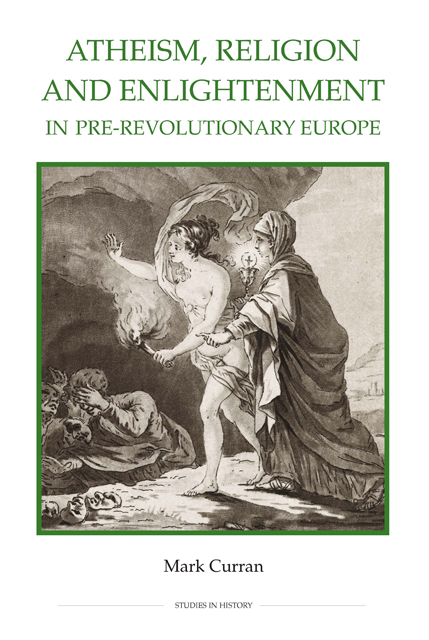Book contents
- Frontmatter
- Contents
- List of figures
- Acknowledgements
- Abbreviations
- Prologue
- Introduction
- 1 The virtuous atheist
- 2 The oral and written public sphere
- 3 Books and pamphlets
- 4 Periodicals
- 5 The philosophe response
- 6 Institutional reactions in France
- 7 The Christian Enlightenment?
- 8 Beyond the Christian Enlightenment
- Appendices
- Bibliography
- Index
3 - Books and pamphlets
Published online by Cambridge University Press: 14 February 2023
- Frontmatter
- Contents
- List of figures
- Acknowledgements
- Abbreviations
- Prologue
- Introduction
- 1 The virtuous atheist
- 2 The oral and written public sphere
- 3 Books and pamphlets
- 4 Periodicals
- 5 The philosophe response
- 6 Institutional reactions in France
- 7 The Christian Enlightenment?
- 8 Beyond the Christian Enlightenment
- Appendices
- Bibliography
- Index
Summary
Livres. Il n’y a que les livres de plain-chant qui soient utiles à l’Eglise. On peut encore permettre aux chrétiens de lire l’Imitation de Jésus-Christ, La Légende dorée et les Heures; tous les autres livres ne sont bons qu’à brûler ou à placer dans une bibliothèque des moines, où ils ne sont pas dans le cas de nuire à personne.1
[Books. Only books of plainsong are useful to the Church. We can also allow Christians to read The Imitation of Christ, The Golden Legend and the Book of Hours; all other books are only good to burn or to place in a monk’s library, where they can harm no-one.]
This entry comes from d’Holbach’s Théologie portative, the mock pocket dictionary that he published towards the end of 1767 with the tongue-in-cheek intention of making theology more accessible to the average reader. His contention that the Church considered only three books tolerable was not to be taken literally, no more so than his claims that the faithful would be better off born without eyes (to save effort tearing in them out to avoid the latest clerical scandal) or that werewolves are useful to Christians in their quest to scare the population. None the less, his message could hardly have been clearer – religious publishing was stuck in the Middle Ages and books were the prerogative of more progressive voices. The argument was a philosophe favourite, one that has been subjected to little scrutiny in the various modern secular readings of both the public sphere and the Enlightenment. Books were, and remain, the principal symbol of the Enlightenment. It is therefore curious that, in the two decades that followed d’Holbach’s remarks, more than 120 books were published which responded to his works, the vast majority of them from a Christian perspective.
Amongst these works were a series of major theological and philosophical refutations including the abbé Bergier’s Apologie de la religion chrétienne and Examen du matérialisme, as well as von Holland’s Réflexions philosophiques sur le ‘Système de la nature’. These titles are known to d’Holbach scholars, if little discussed, and can be found in the bibliographies of Wickwar, Naville, Vercruysse and Sandrier. The responses to the Système de la nature published by Voltaire, Frederick ii, the Assembly of the Clergy and Séguier of the parlement of Paris have also been examined elsewhere.
- Type
- Chapter
- Information
- Publisher: Boydell & BrewerPrint publication year: 2012

